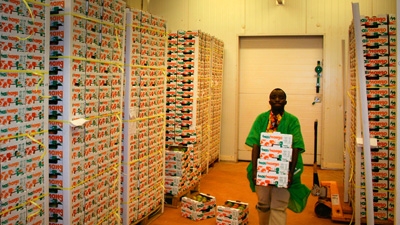Today, the intensive production of papaya no longer holds any mysteries for Daouda Diarra.
Thanks to a television report, this papaya producer based in Ségou, a town bordering the Niger River, 230 kilometers from Bamako, the capital of Mali, learned of the existence of an innovation fund for small farmers under the Agricultural Competitiveness and Diversification Project (ACDP).
This program, which became effective in April 2006 and was launched by the Government of Mali and supported by the World Bank, aims to promote commercial agriculture as an alternative to subsistence agriculture. It provides an opportunity for professionals in the agricultural sectors to increase their yields and revenue.
“My project dealt with the establishment of a drip irrigation system on a Solo papaya plantation. With the grant from the ACDP, I was able to obtain a permanent water source (a very productive large-diameter well), a submersible pump powered by a solar panel, often backed up by a generator, and a drip distribution system,” he attests. The total cost of the project was CFAF 9,650,000, and the ACDP grant provided CFAF 4,825,000 (approximately US$9,650).
“The project is part of the strategy to promote accelerated and equitable growth in rural areas through interventions that promote commercial agriculture in Mali by improving the performance of agricultural and livestock value chains, for which Mali has a comparative advantage on national, subregional, and international markets,” explains Yeyandé Kassé Sangho, an agribusiness specialist in charge of this World Bank project.
From the small traditional company to the industrial enterprise
Nantène Coulibaly, an agricultural engineer, created a grain processing company in the suburbs of Bamako in 1985. Today, she heads Dado Production, an agricultural product processing company launched in July 2009 and registered in the Malian business registry. Her company received technical assistance from the ACDP as well as a grant in the amount of CFAF 3,090,000 (approximately US$6,180) to complete the project, costing CFAF 7,475,000 in total.
Thanks to this financial support, she was able to modernize her company by acquiring a decorticator, a destoner, a crossflow dryer, a gas dryer, as well as a grain grinding mill. Today she employs 16 people, as opposed to four in the beginning, the majority of whom are women. On the advice of ACDP experts, Dado Production adopted the principle of “la marche en avant” (marching forward), which seeks to avoid contamination of foodstuffs and imposes very strict rules for hygiene. The company also diversified its portfolio of product offerings to meet its clients’ demands.
Today, Dado Production produces 5,000 kilograms of grain per month, against 3,500 kilograms in the past. The company also hopes to explore the subregional/international market and move from its status as a Very Small Enterprise (VSE) to that of a Small and Medium Enterprise (SME) with the assistance of an ACDP grant.
“Productive collaboration with the ACDP and a number of supportive people allowed me to realize my vision and my objectives: process and promote agricultural products and local grains in particular; market healthful foodstuffs at the national, subregional, and international levels; increase women’s participation in the country’s economic development; and create jobs for young people,” states Nantène Coulibaly.
Ibrahima Diakité, a farmer in the Kouliloro region about 60 kilometers from Bamako, wanted to obtain the innovative drip irrigation technology, just like Daouda Diarra (mentioned above). “Thanks to ACDP support, I was able to install this irrigation system on my market gardening and fruit tree planting plot,” he explains. “The advantages are, above all, savings of time for watering and of labor, but I also save money.” His only regret? “Despite the involvement of ACDP experts, the procedure for obtaining this assistance is cumbersome and the 50-percent personal contribution required seems quite steep to me (his personal contribution was CFAF 4,995,000),” he explains.
According to Yeyandé Kassé Sangho, the project’s research and development approach, which consisted of demonstrating innovative irrigation and agricultural and livestock product processing technologies during the first phase, helped finalize the technical and economic guidelines (farm budgets) that provided the foundation for the establishment of relevant and profitable small and medium enterprises. At the same time, resolution of the main critical issues surrounding value chains facilitated the marketing of the products targeted. In particular, adherence to the specifications of the Global Partnership for Good Agricultural Practices, the entity that certifies agricultural best practices, helped “unlock” access to the international mango market for the Malian product.
“The project will therefore increase the value of the products marketed and promote profitable small and medium agricultural enterprises among the value chains selected,” notes the World Bank expert. There are 272 existing companies to date and 200 new ones are planned during the additional phase, of which 40 percent are for women. “As a result, the project is expected to increase revenue and employment in rural areas in these intervention zones,” contends Yeyandé Kassé Sangho.
The project, which was initially slated to close in June 2012, was extended until June 30, 2013. The preparation of additional financing—which began in March 2012 and was interrupted by the suspension of disbursements to Mali (OP 7-30)—was relaunched in October 2012. This additional financing is in the amount of SDR 13 million (US$20 million) for a two-year term (2013-2015). This file is expected to be presented to the World Bank’s Executive Board on March 28, 2013.

